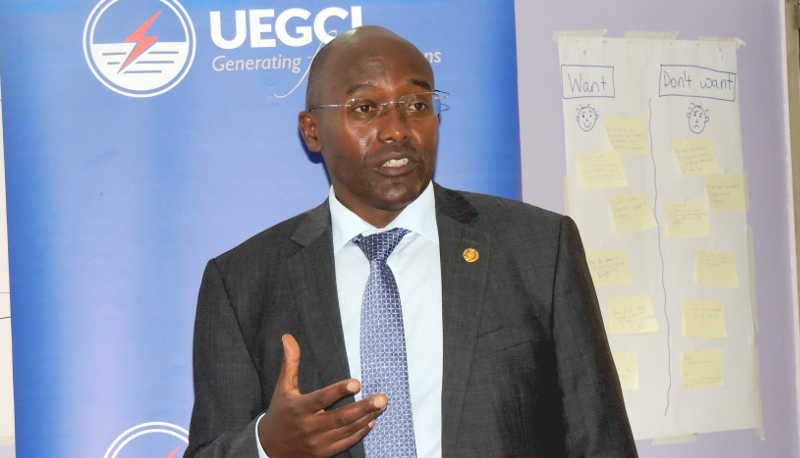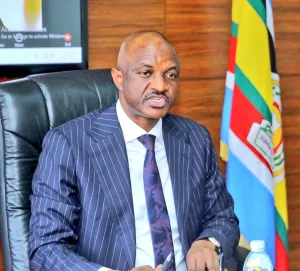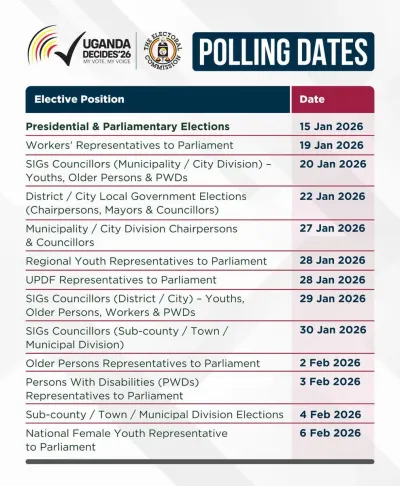

The ‘Youthful’ CEO of Uganda Electricity Generation Company Ltd (UEGCL) Dr. Eng. Harrison Mutikanga while talking to the media at ACME
The Chief Executive Officer of the Uganda Electricity Generation Company, Eng. Harrison Mutikanga revealed this during an interaction with journalists about the activities of the company at the African Centre for Media Excellence (ACME) in Bunga, this week.
Asked about the challenges facing the organisation, Mutikanga said: “When you look around, you will realise there are no competent people to run the dams. Most of the engineers that Uganda trained during the 1950s and 60s to run Nalubaale hydro power dam have retired. We need to replace them”
“That is why we have recruited young engineers who are undergoing training in China. About 30 of them are visiting the plants where some of the equipment we plan to install is being manufactured. This is to ensure that when they return, they will be able to effectively manage the equipment in the new dams.”
He added: “Time has come when Ugandans are able to run their own facilities other than rely on foreigners.” Mutikanga, who formerly worked with the National Water and Sewerage Corporation (NWSC), added that in addition to exporting young talent for training in China, they are also building a training facility in Jinja where, as he said: “We can train professionals.”
Mutikanga argues that the human capacity development being built in China as well as locally, will enable the company to effectively manage the new dams being constructed, other than lease them to foreign companies.
The Uganda, through a loan from the Chinese government is building two dams, a 600 Mega-watt (MW) run of the river Hydro power dam at Karuma falls and the 180MW Isimba hydro power dam, both on the Nile river.
He says that with the hydro power capacity and human capital being built, Ugandans will be able to access cheaper electricity by ensuring that the cost of generation is reduced. Currently, Ugandans are paying a very high price for power partly due to the high cost that was incurred by foreign investors into the Bujagali hydro power dam.
Analysis
A country’s skilled manpower, it has been proved, is its most valuable resource. Uganda’s initiative to skill its own young people, appears to be the most sensible decision the government has taken.
Building a country’s human capacity, especially in such crucial sectors as energy is not only common business sense, it is a great strategic move that helps to promote a country’s sovereignty.
Lessons from many Asian countries such as South Korea and indeed China, show that the countries attained their current industrial prowess by sending young people to established industries in Europe, Japan and the United States where they acquired the know-how not only to manage the equipment but also to manufacture them.
It was a deliberate decision by the governments of those countries which also made sure that the trained personnel returned to their home countries to work in the factors.
Uganda’s experience especially in the training of medical professionals does not provide sufficient guarantees that those trained with hard-earned public resources, are bonded at least for a given period of time, so that the country does not lose them to other countries, which did nothing in their training.
Unconfirmed reports also indicate that although the government has invested a lot of money in the development of the two dams at Karuma and Isimba, the South African Eskom company, which is managing Nalubaale, intends to bid for the management of the dams.
Eng. Mutikanga dismissed the possibility that the organization he heads, which has the mandate to grant concessions to private players to manage power installations, will give up the two dams for management. He insisted that UEGCL has the capacity to manage the two dams when they are completed, starting with Karuma next year.
And if these national assets eventually end up being managed by private companies, the return to the tax payer from the investment in human capital development, will be diminished if the trained engineers end up working for a private company than a public company.
Greater involvement the state in the management of the economy, has gathered momentum in recent years. There is a growing sense that privatisation has not benefited the country, as earlier preached. One of its biggest defects, has been the loss of capital through foreign exchange haemorrhage, to the private companies or the countries of origin for the companies that manage the national assets.
The second, and perhaps even more dangerous outcome of the privatisation process has been the resultant large-scale corruption, where well-connected public servants have hidden behind the foreign companies to grab the national assets.
The resultant conflict of interest from being owners while at the same time being regulators, has resulted into inefficiency, loss of public revenue, high-income inequality and an entrenchment of dictatorship as the well-connected public servants find it attractive to use ill-gotten resources from the management of national assets to bribe politicians to keep them in power and perpetuate the cycle of corruption.
The worrying thing is that the above scenario may already be playing out in Uganda’s energy sector as two reports one by Parliament of Uganda and another by the Auditor General, appear to indicate.














Henry Lutaaya
Leave a Comment
Your email address will not be published.